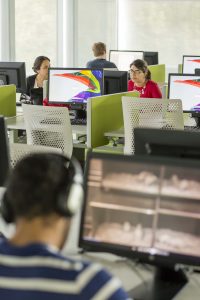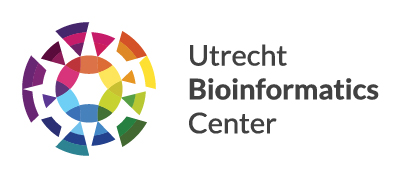The Bioinformatics profile introduces life science students into techniques and algorithms that are used in bioinformatics. Students learn more advanced bioinformatics skills by doing an internship in UBC research groups.
What are the experiences of our first graduates?
 Most of the Master’s profile students want to learn how to analyse and leverage the results of high-throughput data and know how to move from wet-lab to dry-lab research.
Most of the Master’s profile students want to learn how to analyse and leverage the results of high-throughput data and know how to move from wet-lab to dry-lab research.
For example Rianne Rijken: “At the end of my major 9-month internship, I was frustrated with the amount of repetitive work I had to perform in my lab every day. Therefore I was looking for a new challenge to learn some new skills during my minor internship, and that’s why I wanted to do the Bioinformatics profile. I have specifically chosen for the extended profile with the 6-month internship, so I had more time to practice my knowledge.”
Opportunity to improve
One suggestion of the students is to strengthen the sense of a bioinformatics student community. Ángela Sedeño Cacciatore explains why: “For profile students, there is not yet a good way to share experience. It could be encouraging and helpful to see how others are learning and an opportunity to get to know more about different fields.” Rianne Rijken agrees with her: “It’s nice to let a group of Bioinformatics students start at the same time and have an introductory course or day together. It’s good for the feeling of coherence to know which other students also started with the profile, especially since you’re doing the courses with students from different Master’s programmes and PhD candidates as well.”
What’s most difficult?
For some students, the hardest part of the profile is understanding what happens within the code. Not for Jennifer van der Linden. She is sure that after finishing her Master’s programme, she will search for a job in bioinformatics, especially something with programming. “Because I loved that I got to learn my programming skills.”
For Ángela, who will start a PhD in bioinformatics, it was the interdisciplinarity. “Having no experience in bioinformatics, learning how to use the techniques seemed the most challenging part, but… How to go about a bioinformatics project as opposed to a wet lab one was more daunting. Precisely that’s why a research internship during the profile is great. To get these skills in the context of an actual project and with the support of experienced people. I have become more confident about programming, know more about existing algorithms and how to apply them. I have insight on using this knowledge to answer my research questions, and more important, I have discovered my career interests.”
Bright future
Bioinformatics knowledge is an excellent start for several types of careers. Students with bioinformatics skills may easily find jobs, often as a PhD candidate. Matthijs van Kesteren, on the other hand, will start a data science traineeship. “Actually, a lot of skills I learned during the profile will be relevant for me, like Python and R programming. On the long term, I will definitely keep my options open to go back to bioinformatics, after having gained more data science skills!”

